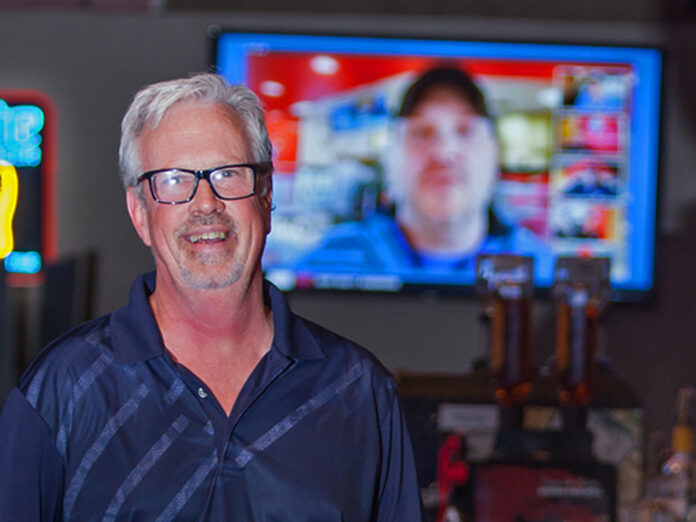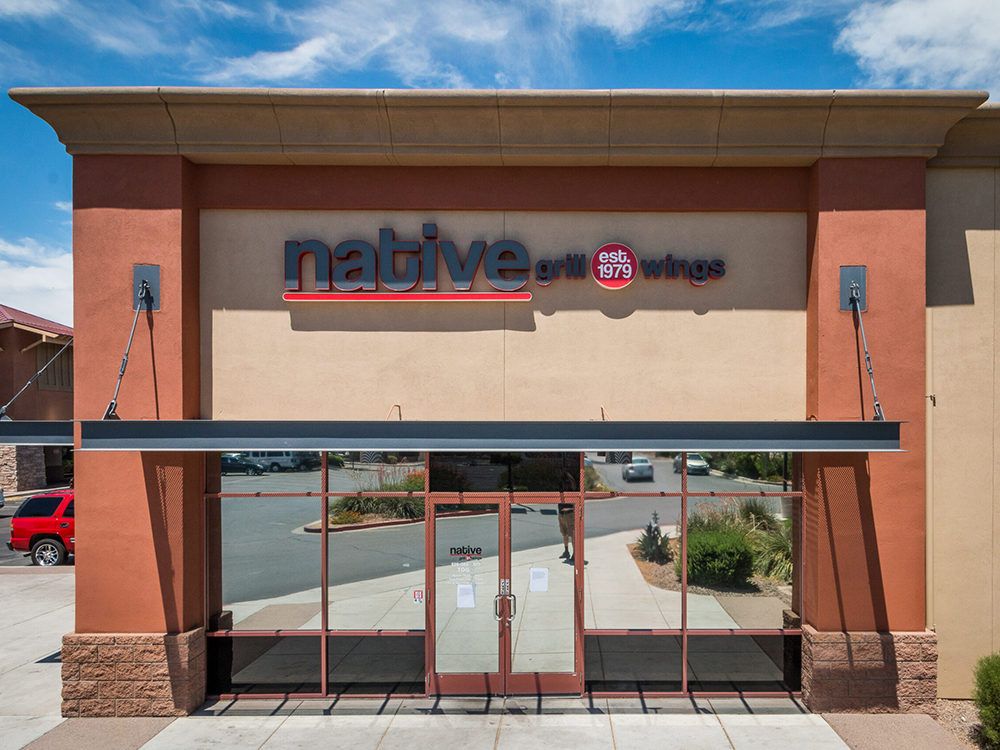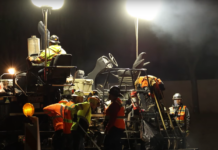
All business owners encounter hurdles as they are getting things going; it’s part of the process.
Pat Kieny, the owner of Native Grill & Wings, has experienced more than his share.
He opened his first Native Grill in Mesa just five days before the 9/11 attacks on the United States. (He sold that store in 2019 but still owns another location in Laveen.)
He weathered the housing crash that devastated Maricopa’s economy for years beginning in 2008.
He rebounded after two early morning kitchen fires – the first in November 2013, and then another in January 2019, which closed the restaurant for five months.
And now, like all local business owners, he is dealing with the COVID-19 crisis. But he knows it will pass, as the other crises have.
“The time in 2001 after 9/11 was very scary because we didn’t know what was going to happen or how long it would last,” he said. “People were just scared and were staying home. Thankfully, it just lasted a few months and it pretty much went away unless you went to the airport.”
He was obviously not deterred because just four years later, on July 25, 2005, he opened Native in Maricopa, at 21164 N. John Wayne Parkway, as one of the first sit-down restaurants in town. The way he selected Maricopa is interesting.
“We chose Maricopa because I was driving through in 2003 and I saw the Bashas’ going up — there was nothing on the east side of John Wayne Parkway where Fry’s is now – and I saw that, and all the other building going on, and thought the city was going to take off,” he said. “The building we’re in was already under construction, it was basically just a roof and some air conditioning units, but it was originally designed as four suites. I just thought this would be a great place to have a restaurant. I called the landlord and he said he’d be happy to lease it to us as a restaurant, and we spent about 18 months doing the improvements and getting it open, and we were on our way.”
According to Rod Tichnor, who owns two Native Grill restaurants in Ahwatukee, Kieny’s choice of Maricopa was perfect.
“I think Maricopa is a perfect place for Pat to own a restaurant,” said Tichnor, who worked with Kieny at Wendy’s in Tempe when both were getting started in the industry. “It’s a very locally oriented community and that’s perfect for him. People associate him with Native Grill. He’s very eager to give back to the community, give to fundraisers, and has a reputation as just being a great guy.
“Pat wants to do the right thing,” Tichnor continued. “He cares a lot about his customers and employees, and he values friendship and relationships tremendously. He’s also a good man of faith and believes if he does the right thing for you, you’ll do the same for him.”
‘WE’RE BACK AGAIN AND DOING GREAT’
Kieny’s first few years were great, as he established himself in town and built a reputation for quality food and great service. But then the housing market collapsed in 2008. “Those few years after that weren’t fun, but now we’re back again and doing great,” he said.
But that experience steeled him for what has transpired since March 2020 with COVID-19. Surprisingly, he says the business isn’t tremendously different than before COVID. “We have always done a lot of takeout business because of big sporting events like the Super Bowl, and big events like graduation parties,” he said. “So, we were well positioned to deal with a change to an emphasis on a takeout.”
Kieny said the up-and-down nature of the economy has always been the hardest part of being in business. He said striking a balance between offering the best possible customer service against wasting money when things are really tight is the toughest thing he has to do.
Having to shut down in-person dining for eight weeks due to the state stay-at-home order was also rough, especially coming at what is traditionally Native’s busiest time of the year. But Kieny agreed with the decision at the time.

“I thought it was right thing to do when it happened,” he said. “We didn’t know exactly how big this thing was going to be or how long it was going to last, so to be safe it was the right thing to do. We’ve learned a lot more now about how to be open to dining in and still be safe, so we’re getting a handle on it from our perspective.”
He said it took two to three weeks to get organized so he could provide the level of service expected by his customers and get out food out in a timely manner. But he quickly got the proper processes in place, and it turned out they were able to get back to in-person dining a little sooner than he thought — at 50% capacity.
“Both our staff and the customers were able to shift our business model pretty easily to adapt to the reality of the situation,” Kieny said. “In the beginning it was a little tough if we had a ton of people all coming in at once, but we’ve been able to adjust quickly if we need to. Customers are adjusting to scheduling and we’re getting better at getting food out on time. The first few weeks were definitely a learning experience, but we adjusted our staffing and the customers realized they couldn’t expect to get their food in 15 minutes at the busiest times of the week. Now everyone is used to the situation and we’re doing great.”
OLD-SCHOOL FIX: SUNS SHINING
Native, like all local restaurants, is still operating at 50% capacity. That’s mostly not a problem, Kieny said, but high peak times like Friday night and during Sunday NFL games, when people want to stay at their table for three hours or so, hurt a bit.
He said his business is pretty evenly divided now between in-person dining and takeout. “About 30% of our sales is liquor, and the rest is pretty evenly balanced, with about 30% takeout and 40% eat-in,” he said.
One thing Kieny does see as helping business, both during, and hopefully after COVID, is sports. And while he doesn’t position himself strictly as a “sports bar,” games definitely have an impact on the business.
“In our first year at the Mesa store, after 9/11, what helped us more than anything that year was the Diamondbacks winning World Series,” he said. “It really brought people in and brought them together. It did a lot for our business and really helped us rebound.”
And as we emerged from the initial lockdown earlier this year, Kieny said the return of sports was a big part of his business rebounding — the ability for people to gather and watch a game outside their home was huge after being stuck at home for several months. But he’s lost out on Friday night crowds that typically swelled by 30-70 people after high school football games— when fans could attend games.
But overall, sports have a huge impact on the bottom line at Native.
“The capacity limits have hurt our Sunday sales for sure,” Kieny said. “We can only get half full, and those were days we would be at capacity for six or seven hours straight. But it’s not anything we can control so we make the best of it. We’re making up for it on the other days.”
But he said the best thing for business might be an old-school fix.
“I’m really hoping the Suns can make the playoffs this year,” he said. “They are by far the biggest draw of all the major sports, bigger than football, baseball or hockey by a mile. If they could figure out a way to make the playoffs that would be great for business and for the mentality of the state.
“By then, hopefully, the vaccine will be in effect, so that would be great for us in May and June, especially if we’re back to 100% capacity.”
As concerned as he was about doing business during the pandemic, Kieny’s worry didn’t rise to 2008 levels, when the housing downturn devastated the economy and his circumstances were different.
“In 2008 I was in a much different position, I owed money to the banks, it was just a whole different situation,” he said. “This time I’m sure there were lots of people who may have thought about losing their businesses, but that wasn’t a worry for me this time around.”
When the lockdown was announced, although he wasn’t worried about losing the business, he obviously did have concerns, including his staff, which was reduced from 60 to 21 during the lockdown. It is now back to 60 employees.
“The first thing I thought about was our employees. I was worried about whether we would have enough money to pay our employees. That was the first thing I wanted to be sure we were able to do.”
This story appears in InMaricopa’s Restaurant Guide 2021.

![Shred-A-Thon to take place tomorrow An image of shredded paper. [Pixabay]](https://www.inmaricopa.com/wp-content/uploads/2024/03/shredded-paper-168650_1280-218x150.jpg)






![Elena Trails releases home renderings An image of one of 56 elevation renderings submitted to Maricopa's planning department for the Elena Trails subdivison. The developer plans to construct 14 different floor plans, with four elevation styles per plan. [City of Maricopa]](https://www.inmaricopa.com/wp-content/uploads/2024/04/city-041724-elena-trails-rendering-218x150.jpg)




![Shred-A-Thon to take place tomorrow An image of shredded paper. [Pixabay]](https://www.inmaricopa.com/wp-content/uploads/2024/03/shredded-paper-168650_1280-100x70.jpg)


